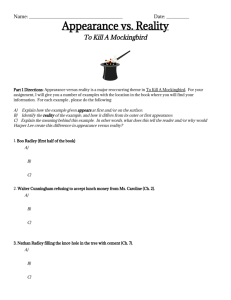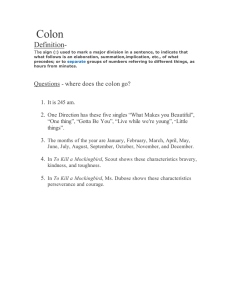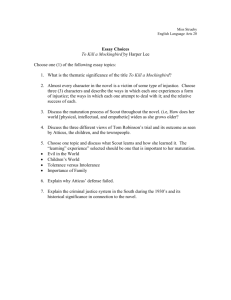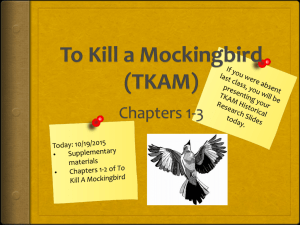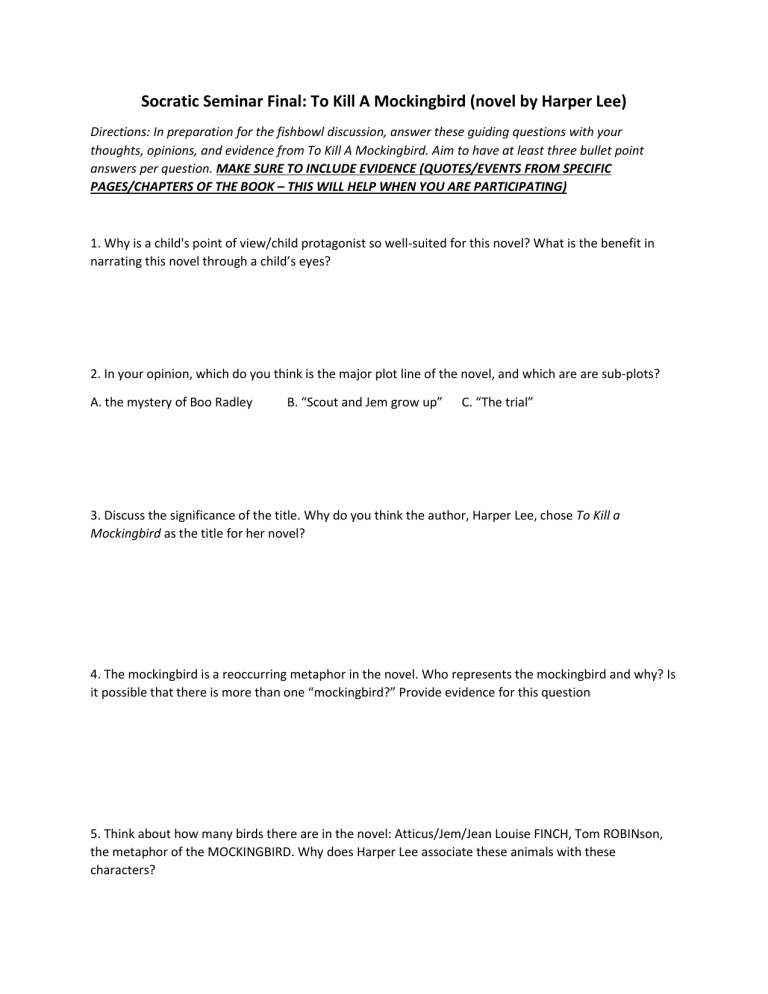
Socratic Seminar Final: To Kill A Mockingbird (novel by Harper Lee) Directions: In preparation for the fishbowl discussion, answer these guiding questions with your thoughts, opinions, and evidence from To Kill A Mockingbird. Aim to have at least three bullet point answers per question. MAKE SURE TO INCLUDE EVIDENCE (QUOTES/EVENTS FROM SPECIFIC PAGES/CHAPTERS OF THE BOOK – THIS WILL HELP WHEN YOU ARE PARTICIPATING) 1. Why is a child's point of view/child protagonist so well-suited for this novel? What is the benefit in narrating this novel through a child’s eyes? 2. In your opinion, which do you think is the major plot line of the novel, and which are are sub-plots? A. the mystery of Boo Radley B. “Scout and Jem grow up” C. “The trial” 3. Discuss the significance of the title. Why do you think the author, Harper Lee, chose To Kill a Mockingbird as the title for her novel? 4. The mockingbird is a reoccurring metaphor in the novel. Who represents the mockingbird and why? Is it possible that there is more than one “mockingbird?” Provide evidence for this question 5. Think about how many birds there are in the novel: Atticus/Jem/Jean Louise FINCH, Tom ROBINson, the metaphor of the MOCKINGBIRD. Why does Harper Lee associate these animals with these characters? 6. To Kill a Mockingbird is a highly controversial book with some people arguing that it is inappropriate for children because of its themes and the portrayal of certain characters and stereotypes. Which elements of the book do you think its critics found troubling? 7. The novel’s use of the “n-word” caused it to be censored in many places across the country. It was most recently banned in January 2022 in Seattle for its “inappropriate” language. Do you agree or disagree with this ban of To Kill a Mockingbird? Why/why not? 8. The class discussed how cancel culture was hurting our society more than it was helping us make progress. Where does the conversation regarding the “n-word” fit in to all of this? Do you think our collective censorship of this word is justified? Why/why not? 9. Out of the following themes, which do you think the novel explores the most? Why is it important? A. loss of innocence B. coming of age C. the nature of evil E. man’s inhumanity to man F. intolerance breeds injustice D. the brotherhood of man 10. Why does Atticus Finch risk his reputation, his friendships, and his career to take Tom Robinson's case? Do you think he risks too much by putting his children in harm's way? 11. Are there any heroes in the novel? If so, who, and why/why not? 12. Reflecting on the events of To Kill a Mockingbird, do you think the United States has overcome its history of racism and discrimination against Black people and other people of color? Why/why not? 13. In your opinion, does To Kill A Mockingbird still resonate in today’s world? How so? What rules/lessons does it offer in our progressive, diverse world? 14. To Kill a Mockingbird is a highly controversial book with some people arguing that it is inappropriate for children because of its themes and the portrayal of certain characters and stereotypes. Which characters/stereotypes/themes of the book do you think they found troubling? 15. Should we or should we not have studied To Kill a Mockingbird? Why or why not?
